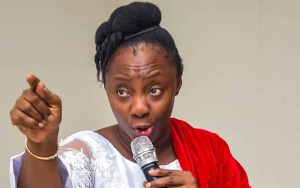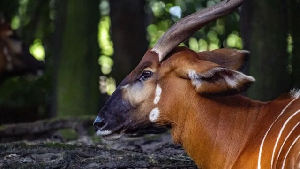When it starts to rain heavily in March in Ghana not only do we end up with people totally soaked during a parade but in addition farmers get confused. Should they start sowing seeds that will feed us later in the year or should they wait for the “actual” rains? There are extreme weather changes; while some parts of the world continue to battle with extremely cold weather and heaps of snow at this time of the year, others are experiencing heat waves that make it difficult to stay indoors especially when one does not have the luxury of regular electricity to ensure that at the very least a fan can be switched on. This must be Climate Change staring us right in the face.
It may not snow in Tamale today but we should be aware that Global Warming is a reality and though it leads to an increase in global temperature it also sets the stage for extreme weather conditions that include: flooding, droughts, pockets of severely cold weather, ice storms and blizzards on the one hand and heat waves on the other. This is no time to discard warnings about global warming because you have heard of or experienced a severe winter or you have been blessed with rain in March. We should all be even more aggressive about doing our bit to reduce the impact of global warming because this trend of extremes of harsh weather conditions both hot and cold has been predicted by gurus of Global Warming several years ago.
Climate Change resulting from Global Warming poses huge threats to our health and very existence and we are prone to a myriad of problems including:
• Respiratory and heart diseases will be on the increase from the extreme heat. Vectors of diseases such as malaria will thrive so we will have more ill people. Asthma for instance will have a field day as pollution increases.
• As some regions become drier, droughts will set in leading to a shortage of food and water. Migration will increase leading to overcrowding with all its attendant health problems such as tuberculosis.
Once again I have called on Dr Ama Essel (AE) a Climate Change expert to help us put things in the right perspective.
KCE: What does climate change involve and is there an immediate danger?
AE: Any significant change in measures of climate (such as temperature, precipitation, or wind) lasting for an extended period. (Decades or longer).
It may also be described as change of climate which is attributed directly or indirectly to human activity that alters the composition of the global atmosphere and which is in addition to natural climate variability observed over comparable time periods. Several years of human activities are to be blamed and these include:
• Burning of fossil fuels (charcoal, coal, and oil), deforestation, desertification, agricultural activities, transportation, urbanization, waste management, bush burning and industrialization.
Climate change threatens the basic elements of life such as access to food, water, shelter and clean air - which in turn severely impacts human health. Decisions on responding to climate change need to put health at the centre.
KCE: What is Global Warming?
AE: Increases in atmospheric temperature resulting in changes in rainfall patterns, heat waves, rising sea levels among others. This can be observed and it has also been projected.
KCE: What can be done to reduce the impact of Global Warming/Climate Change?
AE: Scientifically our response to climate change should be adaptation and mitigation. This should be done at the individual level, national, regional and global levels.
Adaptation
Designing and implementing measures to reduce the impact of climate change. Adaptation will be necessary to address impacts resulting from the warming which is already unavoidable due to past emissions. For example planting drought resistant crops or building dams to irrigate arid land or for droughts.
Mitigation
Reducing greenhouse emissions and thereby reducing exposure to green house gases. Climate mitigation is any action taken to permanently eliminate or reduce the long-term risk and hazards of climate change to human life, property. For example planting trees.
KCE: Most of us expect the world to warm up leaving us all sweating but we see and hear about severe winters. What is the explanation?
AE: Global warming is what most people know and have heard about. We say the world is warming up and because the average global temperature has increased it triggers all the extreme events that were discussed earlier. So an extreme weather event can be a bitingly cold winter, a heat wave during summer, rainstorms leading to floods or lack of rain or droughts leading to famine.
KCE: What is your greatest worry?
AE: African countries, small island states and other developing countries may be unable to adapt and mitigate climate change appropriately due to financial and technical constraints. Though developed countries have pledged a ‘fast track finance’ to support developing countries, availability and accessibility has been a big barrier. This raises questions on how we are going to be able to access the much bigger amounts that are needed to address climate change especially Adaptation. Africa emphasizes that adaptation is our priority.
KCE: The Bible has described scenes in the future that in my opinion appear to be effects of Global Warming/ Climate Change. What is your take on that?
AE: The bible talks about increased natural disasters in the end times, conflicts and war. Climate change will and is increasing the incidence of natural disasters e.g. hurricanes, floods etc. Studies have shown that some of the rippling effects will include conflicts as people will be displaced because of these events and there will be conflicts and wars over land and the little available water.
A Pentagon Report points to possible "catastrophic droughts, famines and riots, with skirmishes over food and water, mass migration and economic disruption. Starvation and disease will decrease population size".
KCE: Thank you very much Ama for giving us such insight into this topic and I hope that together we will be able educate more people including those in positions to bring about major change.
AE: You are welcome.
So my dear reader when you hear about biting cold and long winters, severe hot weather, tsunamis and earthquakes remember all these are part of climate change. We have all played a role in getting our world here so let’s do our bit to control it by reducing pollution and encouraging our governments to do their part as well. Yes we may not have all the facts and we may be “optimists” but is it not better to be safe than sorry? Let us put in the necessary measures now. Like a good doctor put it; “if you have a stiff neck and can’t stand bright light, I will treat you for meningitis. I won’t wait till there is absolute proof because if you do have it and you don’t get immediate help you will die.” I think we should adopt this same approach when it comes to managing Climate Change.
AS ALWAYS LAUGH OFTEN, WALK AND PRAY EVERYDAY AND REMEMBER IT’S A PRICELESS GIFT TO KNOW YOUR NUMBERS (blood sugar, blood pressure, blood cholesterol, BMI)
Dr. Kojo Cobba Essel, MBChB, MBA
Moms’ Health Club
(dressel@healthclubsgh.com)
*Dr Essel is a medical doctor and is ISSA certified in exercise therapy and fitness nutrition.
Thought for the week – “Death by Degrees' is a cute way of saying that while the planetary climate is shifting only slowly, we rather quickly will be seeing a number of bad health effects," Dr Musil,
Opinions of Thursday, 13 March 2014
Columnist: Essel, Kojo Cobba


















